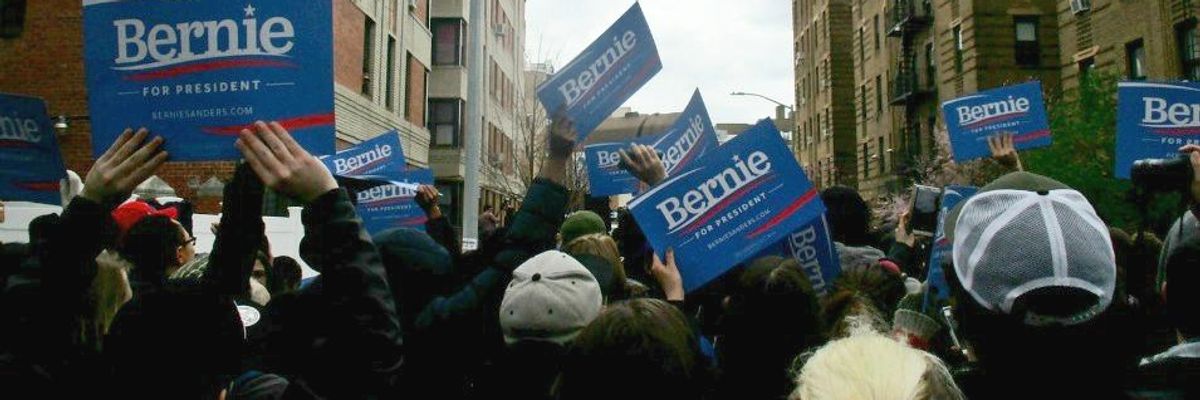As Bernie Sanders and Hillary Clinton prepare to face off in New York on April 19, voters are speaking out against the state's egregious rules that they say favor Clinton and disenfranchise would-be voters.
Two crucial dates for New Yorkers have already come and gone: the October 9 cutoff to change party affiliation and the March 25 deadline to register as a voter. Because the state runs "closed" primaries--which only allows registered Democrats to cast a ballot--voters who weren't aware of the dates will be left out of the process.
For Sanders, who scores high among independents but splits Democrats about evenly with Clinton, the party requirement could be his "Achilles' heel," as MSNBC political reporter Alex Seitz-Wald puts it.
According to Board of Elections data, about 20 percent of the state's 11.7 million voters are unaffiliated with any party, Seitz-Wald writes. Among those barred from casting a ballot next Tuesday are those registered with the Working Families Party, a center-left political party with 48,000 voters, that recently endorsed the Vermont senator.
Voters say that for those who support Sanders--many of whom are first-timers who may not have been aware of the deadlines, and others who didn't catch Bernie fever until he became a serious challenger--the rules amount to disenfranchisement.
"I actually mailed in my registration the moment I felt convinced, which I think was mid-November," a Brooklyn-based political organizer, Kayla Santosuosso, told theGuardian on Tuesday. She only realized she was still unregistered after checking her information on the Board of Elections website six months later.
She wrote on her blog at the time:
[The Fair Elections Legal Network] then directed me to the State Board of Elections, who then directed me to the County Board of Elections, who was finally able to pull up my voter registration card. The conversation went something like this:
BOE: You are registered. But you missed the deadline to re-register your party affiliation.
Me: Huh? But I submitted that almost 6 months ago, in early November.
BOE: Yes, but the deadline to re-register is October 9th. That's over 6 months ago. You can't vote in the Primary.
Tascha Van Auken, who co-founded the volunteer group Team Bernie NY, told MSNBC, "It really is a large segment of New York that gets shut out of the primary. Unless you're very plugged into the political process, you likely don't even realize it."
Another voter said she unknowingly missed the deadline by about a week, and only found out after double-checking her status.
"The most frustrating part to me was that neither the state website nor the Democratic party [notified] me that the registration was invalid," she told the Guardian. "This feels like a bullshit way to disenfranchise people in the primary. Given that our presidential elections are two-party affairs, it seems pretty disingenuous to make it so hard for some people to participate."
Especially, they say, when those people are overwhelmingly in favor of Sanders--who has lost all three closed primaries thus far. According to a recent PRRI/Atlantic poll, the Vermont senator leads Clinton among Democratic-leaning independents, but she bests him among registered Democrats by 21 points.
And nine of the 17 remaining contests are closed.
Peter Grier, a staff writer for the Christian Science Monitor, writes:
If you're outraged that closed primaries exist, and feel that every American should be able to vote for whomever they want in the primaries, tough luck. The parties are in essence private clubs and get to determine how they choose their nominees. Even if some tax dollars get spent in the process.
It's not as if they're actually preventing the candidate who got the most primary votes from being declared the winner. That would be truly anti-democratic, right? Right?
Faced with those odds, pro-Sanders organizers launched a vigorous voter registration drive ahead of New York's October and March deadlines, getting enough information to register about 13,000 people, MSNBC said. And despite the grim outlook, his supporters still have hope.
As Karthik Ganapathy, a spokesperson for the campaign, told MSNBC, "In every one of those primaries and caucuses, a coalition of enthusiastic young people, working families and voters hit hardest by today's rigged economy have come together to defy expectations and build a political revolution."

